

License and Legal Considerations. Libav License.

What is DRM? Good to know: Freeware is not Free Software. Advanced Patent Search. Top EU court upholds right to resell downloaded software. The European Court of Justice has ruled that customers have a right to resell software they purchase regardless of whether the software was originally distributed on a physical medium or downloaded over the Internet.

The ruling is a defeat for Oracle, which had argued that the court should uphold provisions in its license agreement prohibiting such transfers. Software vendors have long argued that software is "licensed, not sold. " Google: Please Don’t Kill Video on the Web - Microsoft on the Issues. Posted by Dave HeinerVice President & Deputy General Counsel, Corporate Standards & Antitrust Group, Microsoft Earlier today, Microsoft filed a formal competition law complaint with the European Commission (EC) against Motorola Mobility and Google.

We have taken this step because Motorola is attempting to block sales of Windows PCs, our Xbox game console and other products. Their offense? These products enable people to view videos on the Web and to connect wirelessly to the Internet using industry standards. Liberation fonts. On May 9, 2007, Red Hat announced the public release of these fonts under the trademark LIBERATION at the Red Hat Summit. There are three sets: Sans (a substitute for Arial, Albany, Helvetica, Nimbus Sans L, and Bitstream Vera Sans), Serif (a substitute for Times New Roman, Thorndale, Nimbus Roman, and Bitstream Vera Serif) and Mono (a substitute for Courier New, Cumberland, Courier, Nimbus Mono L, and Bitstream Vera Sans Mono).
TrueType core fonts for the Web end user license agreement. TrueType core fonts for the Web EULA IMPORTANT-READ CAREFULLY: This Microsoft End-User License Agreement ("EULA") is a legal agreement between you (either an individual or a single entity) and Microsoft Corporation for the Microsoft software accompanying this EULA, which includes computer software and may include associated media, printed materials, and "on-line" or electronic documentation ("SOFTWARE PRODUCT" or "SOFTWARE").
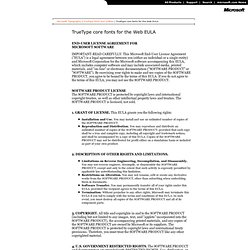
By exercising your rights to make and use copies of the SOFTWARE PRODUCT, you agree to be bound by the terms of this EULA. If you do not agree to the terms of this EULA, you may not use the SOFTWARE PRODUCT. SOFTWARE PRODUCT LICENSE The SOFTWARE PRODUCT is protected by copyright laws and international copyright treaties, as well as other intellectual property laws and treaties. The SOFTWARE PRODUCT is licensed, not sold. Medibuntu. Multimedia, Entertainment & Distractions In Ubuntu. FreeFormats. This document provides a short explanation of what a Free format is, along with some specific information on the range of Free formats which are available for you to use.
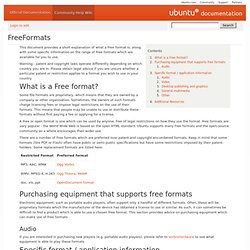
Warning - patent and copyright laws operate differently depending on which country you are in. Please obtain legal advice if you are unsure whether a particular patent or restriction applies to a format you wish to use in your country. Some file formats are proprietary, which means that they are owned by a company or other organisation. Sometimes, the owners of such formats charge licensing fees or impose legal restrictions on the use of their formats. FAQ. 1) Do you license mp3 software to end users?
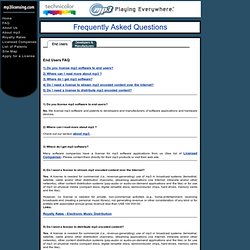
2) Where can I read more about mp3 ? License and Legal Considerations. May 30, 2011.
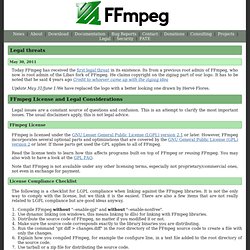
Ubuntucat » Blog Archive » The Legality or Illegality of w32codecs and libdvdcss2. The issue If you’ve ever tried to get multimedia and DVD playback working in Ubuntu, you’ve probably heard about two software packages called w32codecs and libdvdcss2.
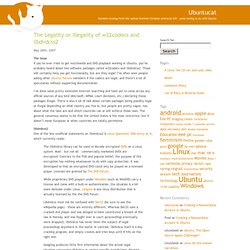
Those will certainly help you get functionality, but are they legal? I’ve often seen people asking other Ubuntu Forums members if the codecs are legal, and there’s a lot of speculation without supporting documentation. I’ve done some pretty extensive internet searching and have yet to come across any official sources of any kind (Microsoft, MPAA, court decisions, etc.) declaring these packages illegal. There is also a lot of talk about certain packages being possibly legal or illegal depending on what country you live in, but people are pretty vague, too, about what the laws are and which countries can or will enforce those laws. The general consensus seems to be that the United States is the most restrictive, but it doesn’t mean European or other countries are totally permissive.
Protecting the pre-OS environment with UEFI - Building Windows 8. There have been some comments about how Microsoft implemented secure boot and unfortunately these seemed to synthesize scenarios that are not the case so we are going to use this post as a chance to further describe how UEFI enables secure boot and the options available to PC manufacturers.
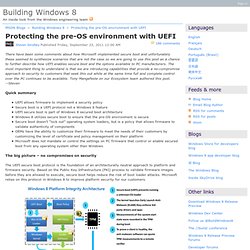
The most important thing to understand is that we are introducing capabilities that provide a no-compromise approach to security to customers that seek this out while at the same time full and complete control over the PC continues to be available. Tony Mangefeste on our Ecosystem team authored this post. --Steven Quick summary The big picture – no compromises on security The UEFI secure boot protocol is the foundation of an architecturally neutral approach to platform and firmware security.
Figure 1 – Platform integrity architecture Microsoft is working with our partners to ensure that secured boot delivers a great security experience for our customers. Microsoft confirms UEFI fears, locks down ARM devices - SFLC Blog - Software Freedom Law Center. At the beginning of December, we warned the Copyright Office that operating system vendors would use UEFI secure boot anticompetitively, by colluding with hardware partners to exclude alternative operating systems.
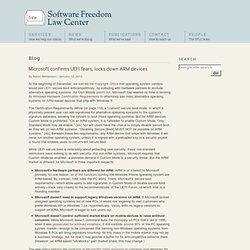
As Glyn Moody points out, Microsoft has wasted no time in revising its Windows Hardware Certification Requirements to effectively ban most alternative operating systems on ARM-based devices that ship with Windows 8. Linux Foundation: Secure Boot Need Not Be a Problem. There's been considerable concern in recent weeks over the secure boot mechanism planned for Microsoft's upcoming Windows 8, primarily among Linux users and others worried that the technology will make it impossible to run alternative operating systems on Windows 8 certified PCs. Such fears were only compounded when the Free Software Foundation weighed in with its own statement of concern about what the technology might mean for users of free and open source software. On Friday, however, the Linux Foundation added its own voice and perspective to the mix with an explanation of why secure boot doesn't necessarily have to be a bad thing for Linux users.
Windows 8 Secure Boot: The Controversy Continues. Microsoft's Secure Boot plans for Windows 8 stirred up quite a hornet's nest of controversy in the Linux world last fall, and recently that debate has started up again. Part of the controversy this time around stems from the revelation that the Microsoft's requirements for ARM-based Windows 8 devices include a mandatory Secure Boot feature, effectively locking down such devices and preventing them from booting non-Windows OSes. Linux users have long been able to install the free and open source operating system on PCs that ship with Windows, but that apparently won't be true with Windows 8 ARM hardware.
"Disabling Secure [Boot] MUST NOT be possible on ARM systems," reads page 116 of the company's Windows Hardware Certification Requirements document, as noted recently by Computerworld UK blogger Glyn Moody. “Microsoft confirms UEFI fears, locks down ARM devices” was the title of the ensuing blog post from the Software Freedom Law Center (SFLC). 'Custom Mode Allows for More Flexibility' Is jailbreaking your iPhone illegal? Not anymore.
iPhone owners in the USA can now legally jailbreak and unlock their iPhone devices, according to new rules set forth by the US Government. While it’s great to have this legalized, it hardly stopped anyone from jailbreaking or unlocking phones in the past. Though legalized, it’s worth mentioning that Jailbreaking or using a carrier unlock on an iPhone or iPad still voids your warranty per Apple’s user agreement. If you have a jailbroken device it’s probably wise to do a clean restore before bringing it in for service. The jailbreaking exemption was part of a handful of exemptions announced Monday, including: Jailbreaking May Soon Become Illegal Again, Act Now To Help Keep It Legal. Creative Commons. Teaching Copyright. What is free software? The Free Software Definition. Patent Trolls.
The U.S. Mobile User Privacy Bill of Rights. Mobile smartphone apps represent a powerful technology that will only become more important in the years to come. But the unique advantages of the smartphone as a platform—a device that's always on and connected, with access to real world information like user location or camera and microphone input—also raise privacy challenges. And given the sensitivity of the data that many consumers store on their phones, the stakes are even higher for manufacturers, carriers, app developers, and mobile ad networks to respect user privacy in order to earn and retain the ever-important trust of the public.
Fortunately, frameworks exist for understanding the privacy rights and expectations of the users.